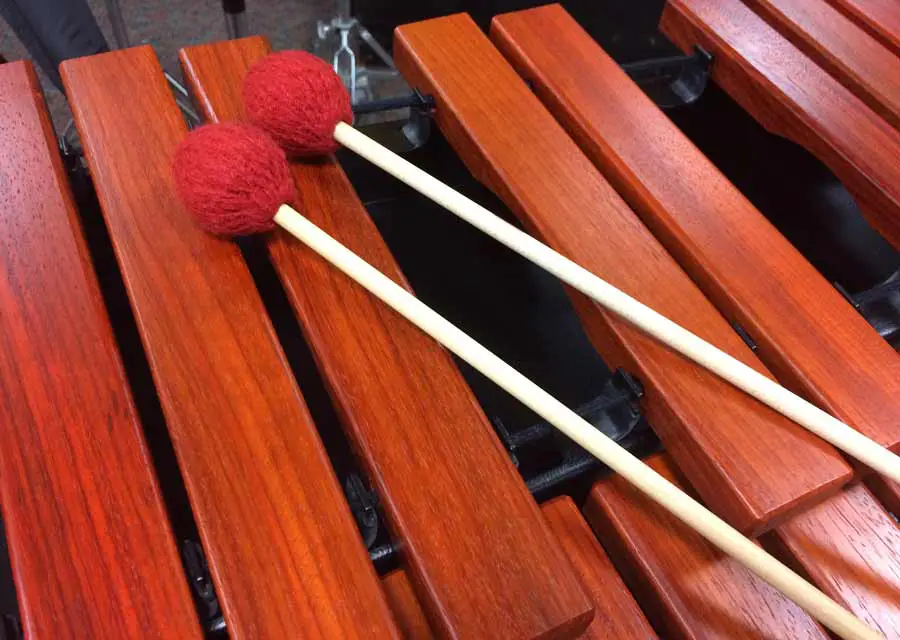The goal of cleaning any instrument is to make sure that it is well-kept and maintains its original quality of sound for as long as possible, and rosewood marimbas are no exception. Although the cleaning process for these marimbas seems pretty straightforward with their rosewood tone bars, the material is actually quite delicate. For that reason, there are a few tips worth knowing to ensure your instrument’s bars stay pristine for years to come.
The best way to clean and maintain rosewood marimba bars is to dust them off with a soft dry cloth every month. Wipe their surfaces down with wax-free lemon oil once every three to six months to help protect the wood from damage.
Cleaning rosewood marimba bars is simple with the right tools, but one misstep can result in permanent damage that may affect the instrument’s overall sound. In the remainder of this article, we’ll discuss best practices for cleaning and maintaining the life of your marimba’s rosewood bars, as well as things you can do to protect the wood from warping or other types of damage.
How to Clean Rosewood Marimba Bars
Before you start cleaning your marimba and its tone bars, you will need the following:
How you clean a marimba’s bars will generally follow the same steps across each type; however, it may differ depending on if your tone bars are coated or uncoated.
The right “lemon oil” will not be a 100% lemon oil but a blend specifically engineered for protecting wood surfaces, preferably instruments. Dunlop and D’Addario both make great lemon oils that are friendly to your marimba bars and wallet. Old English Lemon Oil will work great too.
Cleaning Coated Marimbas
Some rosewood marimbas are coated with a protective lacquer to prevent damage. For this type of rosewood marimba:
- Take your dry cloth and use it to carefully wipe down each of the wooden tone bars to remove any dust present.
- Using another, clean, dry cloth, wipe the bars down with lemon oil; this will only need to be done every three to six months.
If properly cared for, marimba bars with a powdered coat should last up to around twenty years.
Cleaning Uncoated Marimbas
While some rosewood marimbas are coated with a protective lacquer, many are not. If your rosewood marimba is not coated, follow these steps:
- Like with coated marimbas, use a soft dry cloth to wipe down the bars of dust and other small particles.
- Apply lemon oil to the bars only once a month.
Note: Regardless of the type of marimba bars you have, to dust them thoroughly, you may need to disassemble them from the instrument to clean underneath or in-between crevices. In addition, during the oiling step, make sure you do not add the oil directly to the wood; instead, put a small amount of it on a microfiber cloth and use it to wipe down the bars.
Tips for Maintaining Rosewood Marimba Bars
Besides cleaning your marimba regularly, there are plenty of maintenance solutions you can do to ensure they last for a long time.
1. Avoid Humidity & Moisture
Most high-quality marimbas are made from Honduran rosewood, due to the unique sound it helps create with the finished instrument. Before constructing the marimba, this wood is aged and dried for an extensive period. It is this lack of moisture within the rosewood that makes each note ring so crisp and clear.
However, it is also because of this drying process that rosewood marimba bars are vulnerable to moisture. Therefore, if you want to maintain the quality of your tone bars, make sure that you avoid exposing your marimba to any moisture or humidity by following these tips:
- Do not leave any beverages beside or on top of the marimba’s bars to avoid spills and condensation from ending up on the surface.
- Store your marimba in a well-ventilated room (ideally in room temperature) with no more than 50% humidity.
- Avoid playing your marimba outside when there’s high humidity or heat, or in the rain.
2. Use the Right Mallets
As you probably already know, the marimba is a percussion instrument that is hit with mallets to create sound, and different mallets can create different sounds. However, some of these mallets are harder than others and can damage the tone bars on your marimba over time.
For example, if you want your tone bars to last, avoid using metallic mallets; they can damage or completely break wooden bars.
However, you will need to consider more than just the mallet’s hardness. You should also consider its head’s material or bulb size.
- Mallet Head Material – When it comes to your mallet’s material, you have a few options, including rosewood, hytrel, soft rubber, yarn, and cotton yarn. To avoid too much damage, it is usually best to go with a softer material, such as yarn wrapping.
However, note that the mallet material you go with will influence the kind of sound your tone bars will produce as they are struck. For example, yarn-wrapped rubber bulbs provide an extra layer of padding between the rubber and wooden bars, but create a softer sound on impact. A bare soft rubber bulb, on the other hand, will create a unique, louder sound.
- Mallet Head Size – The size of your mallet’s head will also affect how hard or soft you end up striking the tone bars. A mallet with a larger head or bulb will displace the energy at which it hits the wood bars, and therefore have less of an impact. Smaller heads, in contrast, will have a harder impact.
Ultimately, the mallets you choose to play with truly depend on the sound you want to create, your playing style, and whether you want your marimba to blend in or stand out. However, if you want the bars to last as long as possible, a large, yarn-wrapped set of mallets is the way to go.

Other Tips for Maintaining Rosewood Bars
Other tips for maintaining rosewood marimba bars include:
- Before you start playing on your rosewood marimba, be sure to inspect each of the tone plates for any signs of moisture or damage. Striking damaged tone bars with a pair of mallets could potentially make it worse.
- Do not play your marimba with damaged mallets. If you notice your mallets’ yarn is beginning to unravel an excessive amount (making the rubber bulb visible), it’s time to switch them out for a new pair.
- Avoid striking the bars with excessive force. With the right playing style and technique, you can achieve louder sounds without using a lot of power behind it.
- When your marimba is not in use, make sure it is always covered.
- Following a play session, dust down the marimba with a clean, soft cloth; this will remove any particles or dirt left behind from the mallets.
- Do not oil rosewood bars with wax or petroleum-based lemon oil products.
- If you find any chips or cracks on your bars, you may be able to take the individual bar into a shop to get it repaired, although due to the fragility of rosewood, in many cases, you will have to get it replaced instead.
Final Thoughts
Rosewood marimbas are usually one of the most expensive types of marimbas you can find in the musical instrument world, due to their high-quality tone bars and increasing scarcity of the Honduran rosewood used to make them.
For that reason, rosewood tone bars can’t be replaced easily, so it is extremely important to take great care of your rosewood marimba by dusting and oiling the bars regularly and storing the instrument with a cover in a dry, cool space.
You can buy lemon oil from Amazon through the links at the top of this article, or at your local music store.
If you follow those simple tips, your marimba should have a very long life so you can continue to play it for many years to come. Learn more about cleaning percussive instruments.


